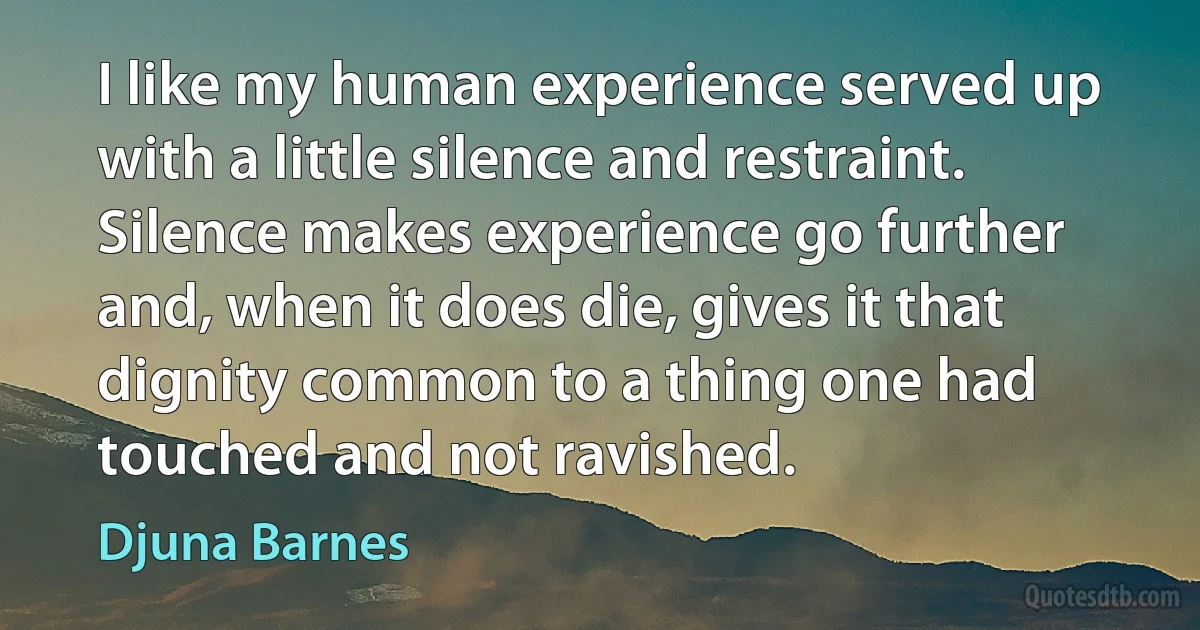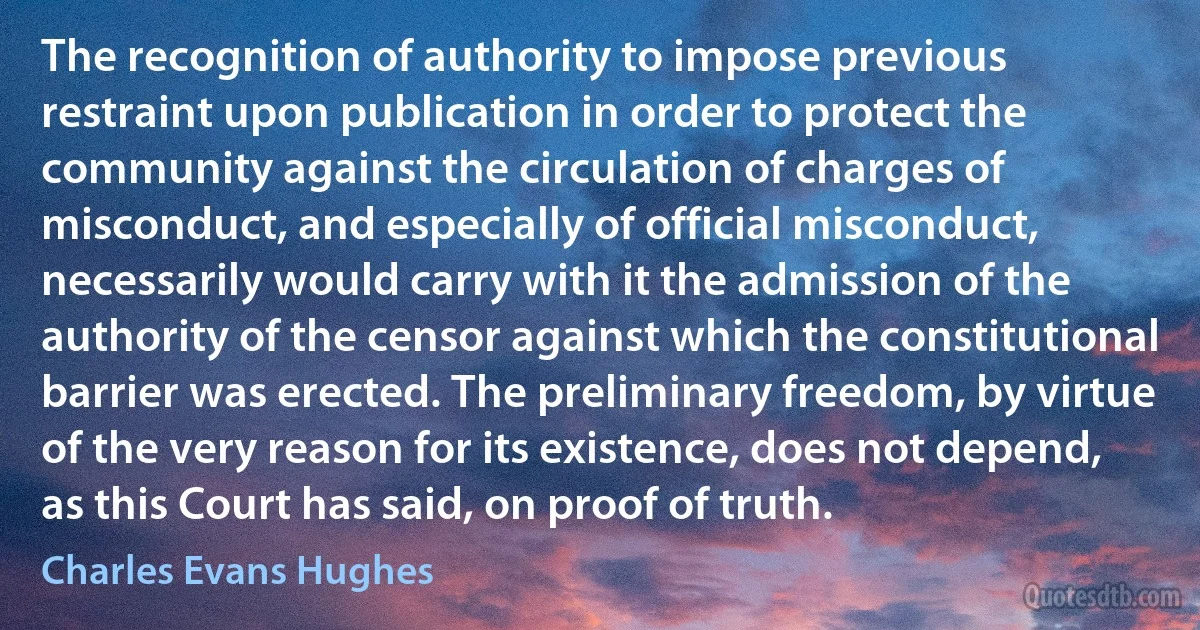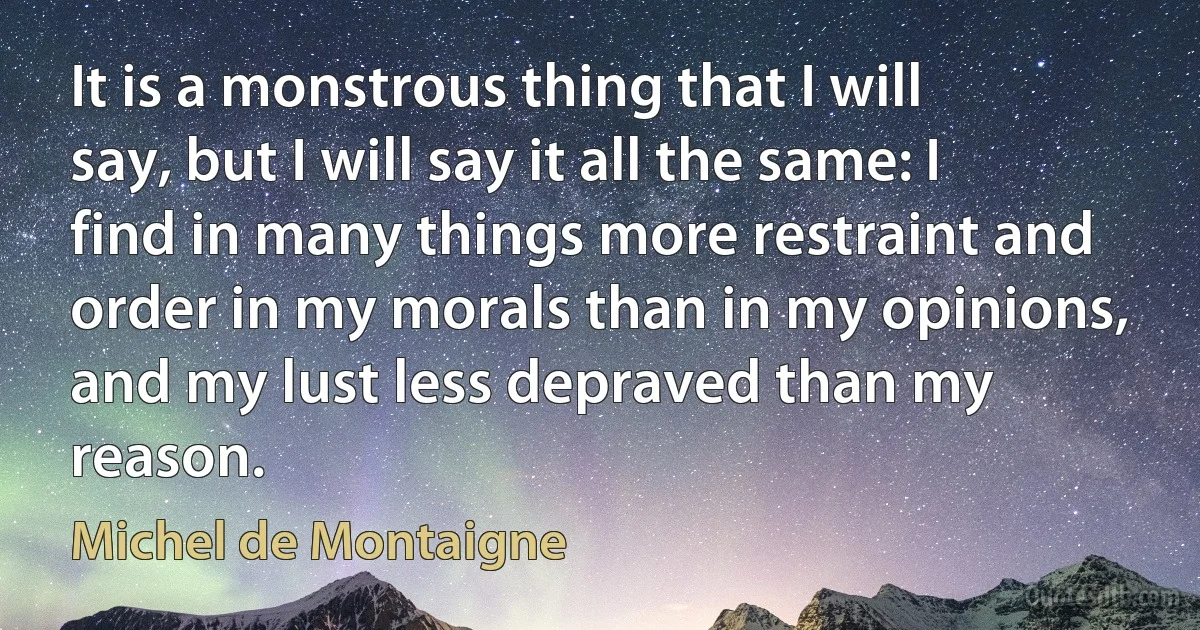Restraint Quotes - page 4
As many of you may know, my first chosen career was in the United States Navy, where I served as a submarine officer. At that time, my shipmates and I were ready for combat and prepared to give our lives to defend our nation and its principles. At the same time, we always prayed that our readiness would preserve the peace.
I served under two presidents, Harry Truman and Dwight Eisenhower, men who represented different political parties, both of whom had faced their active military responsibilities with honor.
They knew the horrors of war. And later as commanders in chief, they exercised restraint and judgment, and they had a clear sense of mission.
We had a confidence that our leaders, both military and civilian, would not put our soldiers and sailors in harm's way by initiating wars of choice unless America's vital interests were in danger.
We also were sure that these presidents would not mislead us when issues involved our national security.

Jimmy Carter
Law and order are the privilege of the poor. So far as they affect the rich they are the restraint of the rich. It is for all those who are interested in the industry and commerce of this country, not for those who are interested merely in fixed capital and the leisurely enjoyment of its fruits, to struggle to maintain the idea of the supremacy of the law.

Robert Gascoyne-Cecil, 3rd Marquess of Salisbury
It is characteristic of the barbarian ... to insist upon seeing a thing "as it is." The desire testifies that he has nothing in himself with which to spiritualize it; the relation is one of thing to thing without the intercession of the imagination. Impatient of the veiling with which the man of higher type gives the world imaginative meaning, the barbarian and the Philistine, who is the barbarian living amid culture, demands the access of immediacy. Where the former wishes representation, the latter insists upon starkness of materiality, suspecting rightly that forms will mean restraint.

Richard Weaver
In our libertarian society, where individual choice is all, ‘liberal' and ‘progressive' have come to mean something very different. Liberals took for granted that freedom depended upon self-discipline. Libertarians decided that all such restraint was repressive. The individual had to be free from all attachments to family, culture, nation, institutions and traditions that might fetter freedom of choice. Since every individual was equally entitled to such free choices, the distinctions that were the basis of morality became eroded.

Melanie Phillips
For what man has sought for is, indeed, neither pain nor pleasure, but simply Life. Man has sought to live intensely, fully, perfectly. When he can do so without exercising restraint on others, or suffering it ever, and his activities are all pleasurable to him, he will be saner, healthier, more civilised, more himself. Pleasure is Nature's test, her sign of approval. When man is happy, he is in harmony with himself and his environment.

Oscar Wilde
The Opera House is a splendid edifice, and I wish to take nothing away from it, but my heart belongs to the Harbour Bridge. It's not as festive, but it is far more dominant – you can see it from every corner of the city, creeping into frame from the oddest angles, like an uncle who wants to get into every snapshot. From a distance it has a kind of gallant restraint, majestic but not assertive, but up close it is all might. It soars above you, so high that you could pass a ten-storey building beneath it, and looks like the heaviest thing on earth. Everything that is in it – the stone blocks in its four towers, the latticework of girders, the metal plates, the six-million rivets (with heads like halved apples) – is the biggest of its type you have ever seen. This is a bridge built by people who have had an Industrial Revolution, people with mountains of coal and ovens in which you could melt down a battleship. The arch alone weighs 30,000 tons. This is a great bridge.

Bill Bryson
The absolute rights of man, considered as a free agent, endowed with discernment to know good from evil, and with power of choosing those measures which appear to him to be most desirable, are usually summed up in one general appellation, and denominated the natural liberty of mankind. This natural liberty consists properly in a power of acting as one thinks fit, without any restraint or control, unless by the law of nature: being a right inherent in us by birth, and one of the gifts of God to man at his creation, when he endowed him with the faculty of freewill. But every man, when he enters into society, gives up a part of his natural liberty, as the price of so valuable a purchase; and, in consideration of receiving the advantages of mutual commerce, obliges himself to conform to those laws, which the community has thought proper to establish.

William Blackstone
The absence of effective State, and, especially, national, restraint upon unfair money-getting has tended to create a small class of enormously wealthy and economically powerful men, whose chief object is to hold and increase their power. The prime need to is to change the conditions which enable these men to accumulate power which it is not for the general welfare that they should hold or exercise.

Theodore Roosevelt
Our interests are at bottom common; in the long run we go up or go down together. Yet more and more it is evident that the state, and if necessary the nation, has got to possess the right of supervision and control as regards the great corporations which are its creatures; particularly as regards the great business combinations which derive a portion of their importance from the existence of some monopolistic tendency. The right should be exercised with caution and self restraint; but it should exist, so that it may be invoked if the need arises.

Theodore Roosevelt
With peace has come prosperity. Burdens have been great, but the strength to bear them has been greater. The condition of those who toil is higher, better, more secure than in all the ages past. Out of the darkness of a great conflict has appeared the vision of a nearer, clearer than ever before, the life on earth and less under the deadening restraint of course more and more under the vitalizing influence of reason. Moral power has been triumphing over physical power. Education will tend to bring reason and experience of the past into the solution of the problems of the future. We must look to service and not selfishness, for service is the foundation of progress. The greatest lesson that we have to learn is to seek ever the public welfare, to build up, to maintain our American heritage.

Calvin Coolidge
The strange light illuminated all those night-time meetings that took place in every imaginable sort of café; the lips mouthing defiant words, heedless of restraint or consequence, often overbearing and brutal as only Norwegians can be, vast shadows of impotence misery and shabbiness – spirits training for fulfillment, striving in vain to be great, complete, unique. [Munch describes the environment and atmosphere of the Norwegian bohemia in Kristiana, where he himself lived and worked when he was about 23] And at the center of all the faces there would be Jaeger, whose logic was as sharp as a scythe and as cold as an icy blast..

Edvard Munch
One question may possibly have dwelt in the reader's mind during the perusal of these observations, namely, Why should not the Deity have given to the animal the faculty of vision at once? ... Why resort to contrivance, where power is omnipotent? Contrivance, by its very definition and nature, is the refuge of imperfection. To have recourse to expedients, implies difficulty, impediment, restraint, defect of power. ... amongst other answers which may be given to it; beside reasons of which probably we are ignorant, one answer is this: It is only by the display of contrivance, that the existence, the agency, the wisdom of the Deity, could be testified to his rational creatures.

William Paley
I have heard that, with some persons, temperance – that is, moderation – is almost impossible; and if abstinence be an evil (which some have doubted), no one will deny that excess is a greater. Some parents have entirely prohibited their children from tasting intoxicating liquors; but a parent's authority cannot last for ever; children are naturally prone to hanker after forbidden things; and a child, in such a case, would be likely to have a strong curiosity to taste, and try the effect of what has been so lauded and enjoyed by others, so strictly forbidden to himself – which curiosity would generally be gratified on the first convenient opportunity; and the restraint once broken, serious consequences might ensue.

Anne Brontë
Since the 1920s, grand illusion on stage has been synonymous with the restraint and mutilation of female assistants, as if the first act a lucky mortal, newly endowed with the ability to overturn the laws of the universe, would wish to carry out would be the casual torture of the fairer sex for our entertainment.

Derren Brown



